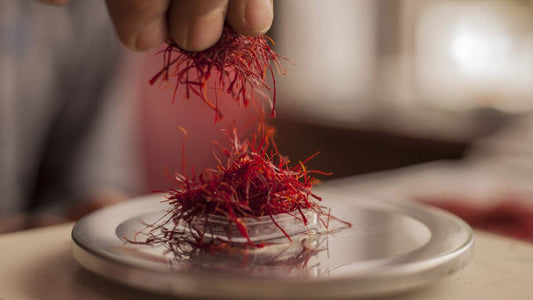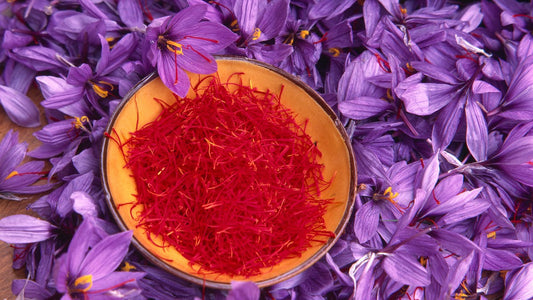The Use of Saffron in Homeopathy: A Natural Path to Healing
Ara OhanianShare
Saffron, often hailed as “red gold,” is not only a prized culinary spice but also a powerful medicinal herb with a long history in traditional medicine. Homeopathy, a holistic healing system developed over 200 years ago, employs natural substances to stimulate the body’s self-healing abilities. Among these natural remedies, saffron holds a special place for its versatile therapeutic properties. In this comprehensive guide, we explore the remarkable uses of saffron in homeopathy and how it can contribute to overall health and well-being.
The Origins and Basics of Homeopathy
Homeopathy, founded by Dr. Samuel Hahnemann in the late 18th century, operates on the principle of “like cures like.” This means that substances capable of causing symptoms in healthy individuals can, in very small doses, treat similar symptoms in sick individuals. Homeopathic remedies are prepared through a process of serial dilution and succussion (vigorous shaking), which enhances their healing properties while minimizing side effects.
Saffron: An Ancient Remedy
Saffron (Crocus sativus) has been used for centuries in various cultures for its medicinal properties. It is rich in carotenoids, particularly crocin and crocetin, which are responsible for its vibrant color and potent health benefits. Saffron also contains safranal, which contributes to its distinct aroma and has several therapeutic effects.
Saffron’s Role in Homeopathy
1. Mood Disorders and Emotional Well-being
• Treatment of Depression: Homeopathic preparations of saffron are often used to treat mild to moderate depression. Studies suggest that saffron’s active compounds, particularly crocin and safranal, have mood-enhancing properties comparable to conventional antidepressants.
• Anxiety Relief: Saffron is also effective in alleviating anxiety symptoms. It helps in reducing stress levels and promoting a sense of calm and relaxation.
2. Digestive Health
• Indigestion and Stomach Ailments: Saffron has been traditionally used to treat digestive issues such as indigestion, bloating, and stomach pain. Its anti-inflammatory and antioxidant properties help soothe the digestive tract and improve overall gut health.
• Appetite Stimulant: In homeopathy, saffron is sometimes prescribed to stimulate appetite, especially in individuals experiencing loss of appetite due to illness or emotional distress.
3. Respiratory Conditions
• Asthma and Bronchitis: Saffron’s anti-inflammatory properties make it beneficial in treating respiratory conditions like asthma and bronchitis. It helps reduce airway inflammation and improve breathing.
• Cough and Cold: Homeopathic saffron is also used to alleviate symptoms of cough and cold, providing relief from congestion and throat irritation.
4. Menstrual and Reproductive Health
• Menstrual Cramps: Saffron is known for its antispasmodic properties, making it effective in reducing menstrual cramps and discomfort.
• PMS and Menopausal Symptoms: Saffron can help balance hormones and alleviate symptoms associated with premenstrual syndrome (PMS) and menopause, such as mood swings, irritability, and hot flashes.
5. Skin Health
• Acne and Blemishes: The antioxidant properties of saffron make it a valuable remedy for skin conditions like acne and blemishes. It helps reduce inflammation and promotes clear, healthy skin.
• Anti-aging: Saffron’s ability to fight free radicals and improve skin elasticity makes it an excellent anti-aging remedy in homeopathy.
How to Use Saffron in Homeopathy
Homeopathic saffron remedies are available in various forms, including pellets, tinctures, and creams. The dosage and form depend on the specific condition being treated and the individual’s overall health. It is essential to consult a qualified homeopath for personalized recommendations and proper dosage.
Precautions and Considerations
While saffron is generally safe when used in homeopathic doses, it is crucial to exercise caution. High doses of saffron can be toxic and may cause side effects such as dizziness, nausea, and allergic reactions. Pregnant and breastfeeding women should avoid saffron without medical advice.
Conclusion
Saffron’s multifaceted health benefits make it a valuable addition to homeopathic medicine. From mood disorders to digestive health, respiratory conditions, and skin care, saffron offers a natural and holistic approach to healing. As with any alternative therapy, it is essential to seek guidance from a healthcare professional to ensure safe and effective use.
Incorporating saffron into your homeopathic treatment regimen can enhance your overall health and well-being, offering a natural path to healing and vitality.
FAQ: The Use of Saffron in Homeopathy
What is homeopathy? Homeopathy is a holistic healing system that uses natural substances in very small doses to stimulate the body’s self-healing abilities. It operates on the principle of “like cures like.”
How is saffron used in homeopathy? Saffron is used in homeopathy to treat a variety of conditions including mood disorders, digestive health, respiratory conditions, menstrual and reproductive health, and skin health.
Can saffron help with depression and anxiety? Yes, saffron has mood-enhancing properties and is used in homeopathy to treat mild to moderate depression and anxiety.
Is saffron effective for digestive issues? Yes, saffron helps with digestive issues such as indigestion, bloating, and stomach pain due to its anti-inflammatory and antioxidant properties.
How does saffron benefit respiratory conditions? Saffron helps reduce inflammation in respiratory conditions like asthma and bronchitis and provides relief from cough and cold symptoms.
Can saffron alleviate menstrual cramps? Yes, saffron has antispasmodic properties that reduce menstrual cramps and discomfort. It also helps with PMS and menopausal symptoms.
Is saffron beneficial for skin health? Saffron’s antioxidant properties make it effective in treating acne, blemishes, and signs of aging by promoting clear and healthy skin.
How should saffron be used in homeopathy? Homeopathic saffron is available in pellets, tinctures, and creams. The form and dosage depend on the condition being treated and should be guided by a qualified homeopath.
Are there any precautions when using saffron in homeopathy? High doses of saffron can be toxic, and it may cause side effects like dizziness, nausea, and allergic reactions. Pregnant and breastfeeding women should avoid saffron without medical advice.
Can saffron be used for overall well-being? Yes, incorporating saffron into a homeopathic treatment regimen can enhance overall health and well-being, offering a natural path to healing and vitality.




